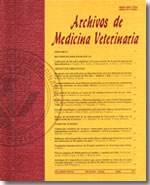Detection of antibodies against the classical swine fever virus by enzime-linked immunosorbent assay (ELISA)
Main Article Content
Abstract
Classical swine fever (CSF) is an important worldwide disease. In Chile, it is subject to a control and erradication programme.
The objective of the present assay was to standardize an immunoenzimatic technique (CIV-ELISA) that detects antibodies of the IgG type directed against the CSF virus and to compare it with seroneutralization.
Twenty hybrid Landrace x Large White pigs with a live weight of 20 kg were used. They were experimentally inoculated with a dose of 100.000 TCID50 of the Quillota virulent isolate of the CSF virus. A four-pig group was vaccinated 14 days before inoculation. Blood samples were taken 3, 6, 9, 12 and 14 days post-inoculation. Serological samples were obtained from 100 sows. The anti-CSF antibodies were determined for a policlonal CIV-ELISA and were compared with a seroneutralization test (serological official test).
The CIV-ELISA test did not detect antibodies in the experimentally inoculated pigs until day 14 post-inoculation. However, the positive-sera condition of previously vaccinated pigs was ratified by the seroneutralization test.
The sensibility and specificity of the CIV-ELISA was about 90.1% and 76.4% respectively. The CIV-ELISA is an easy-to-apply test and the results obtained are similar to those obtained with seroneutralization.

